Introduction
Audit committees play a pivotal role in financial governance, ensuring compliance and safeguarding investor interests. In this article, we explore a series of case studies that illustrate the significance of audit committees in maintaining financial integrity. From addressing non-exempt prohibited transactions to mitigating conflicts of interest, these committees navigate complex regulatory landscapes and evolving financial management approaches.
We examine the impact of audit committee independence on financial reporting quality, the relationship between committee characteristics and earnings management, and the unique challenges faced by audit committees in specific industries such as banking. Additionally, we delve into the effects of CEO duality on audit quality and highlight best practices for implementing effective audit processes in the digital era. These case studies provide practical insights and solutions for CFOs and finance professionals, emphasizing the importance of robust financial oversight and adherence to evolving regulatory requirements.
Case Study: The Role of Audit Committees in Financial Management
Audit oversight bodies are a central component in governance, entrusted with the supervision of audits, compliance, and safeguarding shareholder interests. A notable case exemplifies their function, where the IRS collaborated with the Department of Labor to address non-exempt prohibited transactions by IRA fiduciaries. This formalized coordination aimed to mitigate excise tax evasion, highlighting the committee's role in regulatory adherence.
Furthermore, the intrinsic conflicts of interest in advisories regarding finances were examined in a study reviewing 2,000 conflict disclosures. The findings indicated that mutual funds paying commissions to professionals in the finance industry typically yielded lower investor returns. This emphasizes the importance for oversight bodies to make sure fiduciaries avoid conflicts that could compromise economic outcomes.
In another instance, the Ontario Securities Commission did not find evidence of intentional misconduct by RBC regarding the capitalization of internally developed software costs. Nevertheless, RBC had to enforce remedial actions to avoid comparable shortcomings, showcasing the oversight group's accountability for statement authenticity.
Recent news stories indicate noteworthy changes in management approaches related to money, such as a banking institution modifying its bond portfolio management from 'held to collect and sell' to 'held to collect,' thereby reclassifying bonds and adjusting fair value. This strategic action, prompted by structural changes and capital stability needs, reflects the dynamic environment governing bodies navigate.
In the midst of these developments, audit committees must prioritize spending and provide clear guidance on money matters. Edita BaranauskaitÄ of STATICUS emphasizes the significance of explaining monetary basics to non-monetary teams, enhancing their comprehension. Similarly, Omar Choucair of Trintech advocates for tidy books and informed management to ensure accurate reporting.
To strengthen corporate governance, the SEC suggested enhanced auditor responsibilities to recognize and assess relevant laws and regulations, reflecting the crucial role of the inspection panels in upholding legal conformity and investor confidence. This proposal, together with the FDIC's heightened supervision standards, highlights the evolving landscape of oversight in finance and the ongoing requirement for education of the group on economics and emerging uncertainties.
The efficiency of examination panels is also apparent in evaluating examination charges among S&P 500 enterprises, which differ based on the intricacy and jeopardy implicated in an examination. The Ideagen Audit Analytics report provides insights into fee trends for audits, reinforcing the significance of careful oversight of finances.
To sum up, the groups responsible for overseeing monetary matters play a crucial role in managing compliance and promoting investor trust. By continuously learning and adjusting to regulatory changes, these groups play a vital role in maintaining integrity in money matters and directing organizational strategies.
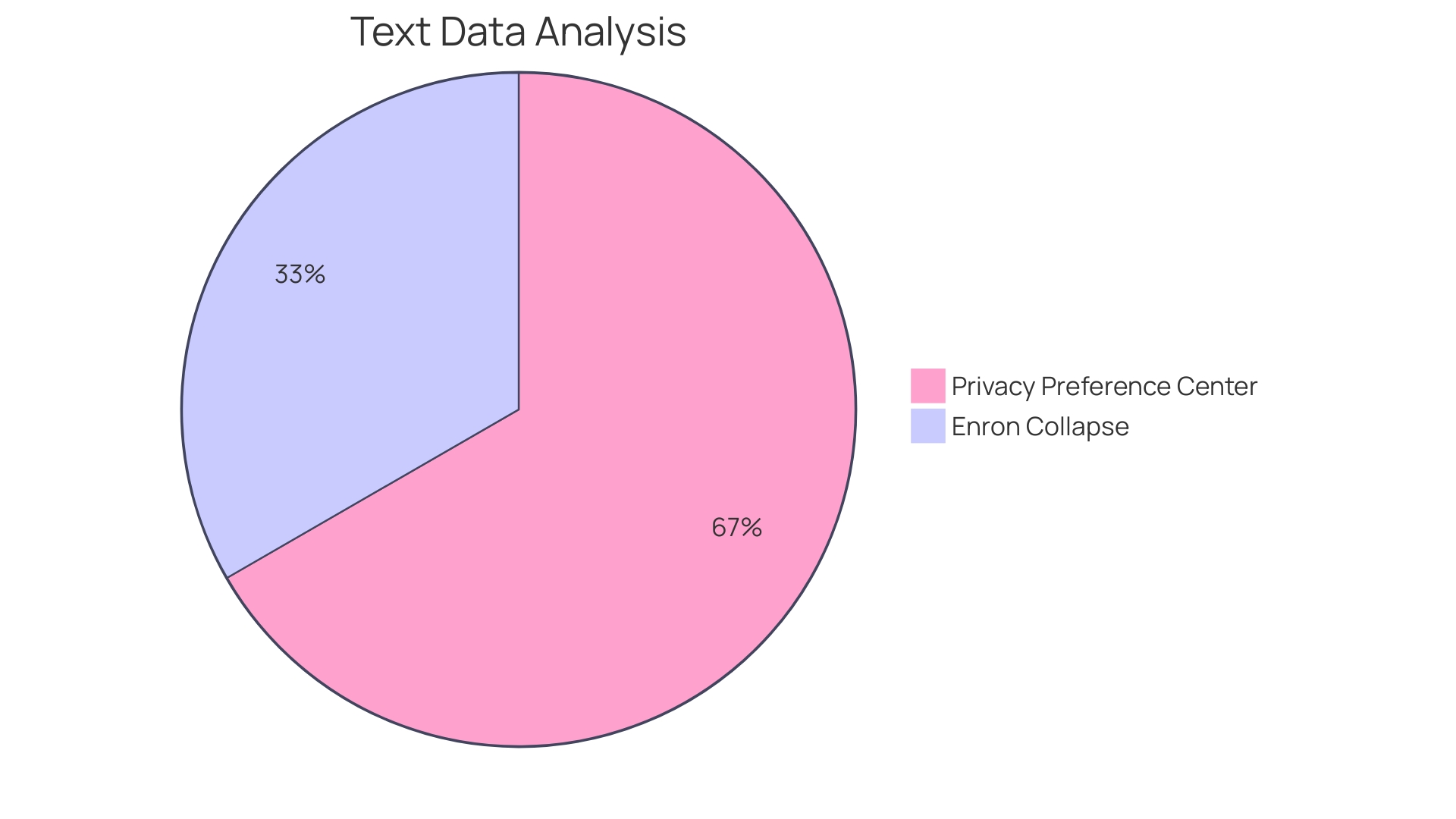
Case Study: Enhancing Financial Reporting Quality through Audit Committee Independence
A separate assessment group is crucial in preserving the quality of reporting on finances. A closer examination of the composition, structure, and expertise of review committees reveals their pivotal role in upholding the integrity of examinations. These elements are instrumental in fostering an environment where objectivity is paramount, thereby amplifying the trust and confidence in capital markets and financial statements.
A prime example of dedication to quality in the examination process is evident in the approach of global organizations like EY. By utilizing collective leadership and striving to create a superior working world, they showcase the pursuit of excellence in evaluation processes. This dedication to quality and integrity is echoed by the insights shared by Omar Choucair of Trintech, who emphasizes the fundamental need for clean, accurate financial reporting as a cornerstone for reliable financial statements.
Furthermore, the historical backdrop given by the Sarbanes-Oxley Act of 2002 and the creation of the Public Company Accounting Oversight Board (PCAOB) emphasizes the development of examination oversight. The PCAOB's mandate to update auditing standards, as discussed in recent conferences, demonstrates a commitment to continual improvement and adaptation to the dynamism of global markets.
When examining the S&P 500 fee trends, Ideagen Audit Analytics brings attention to the intricacy and hazards involved in examining big corporations, emphasizing a pattern of rising fees over the years. This data emphasizes the importance of overseeing committees in managing the costs and ensuring the quality of the examination process.
In summary, the autonomy and effectiveness of review panels are not only abstract concepts but are vital to practical fiscal oversight. Their impact extends from ensuring precise reporting to fostering global economic stability and growth.
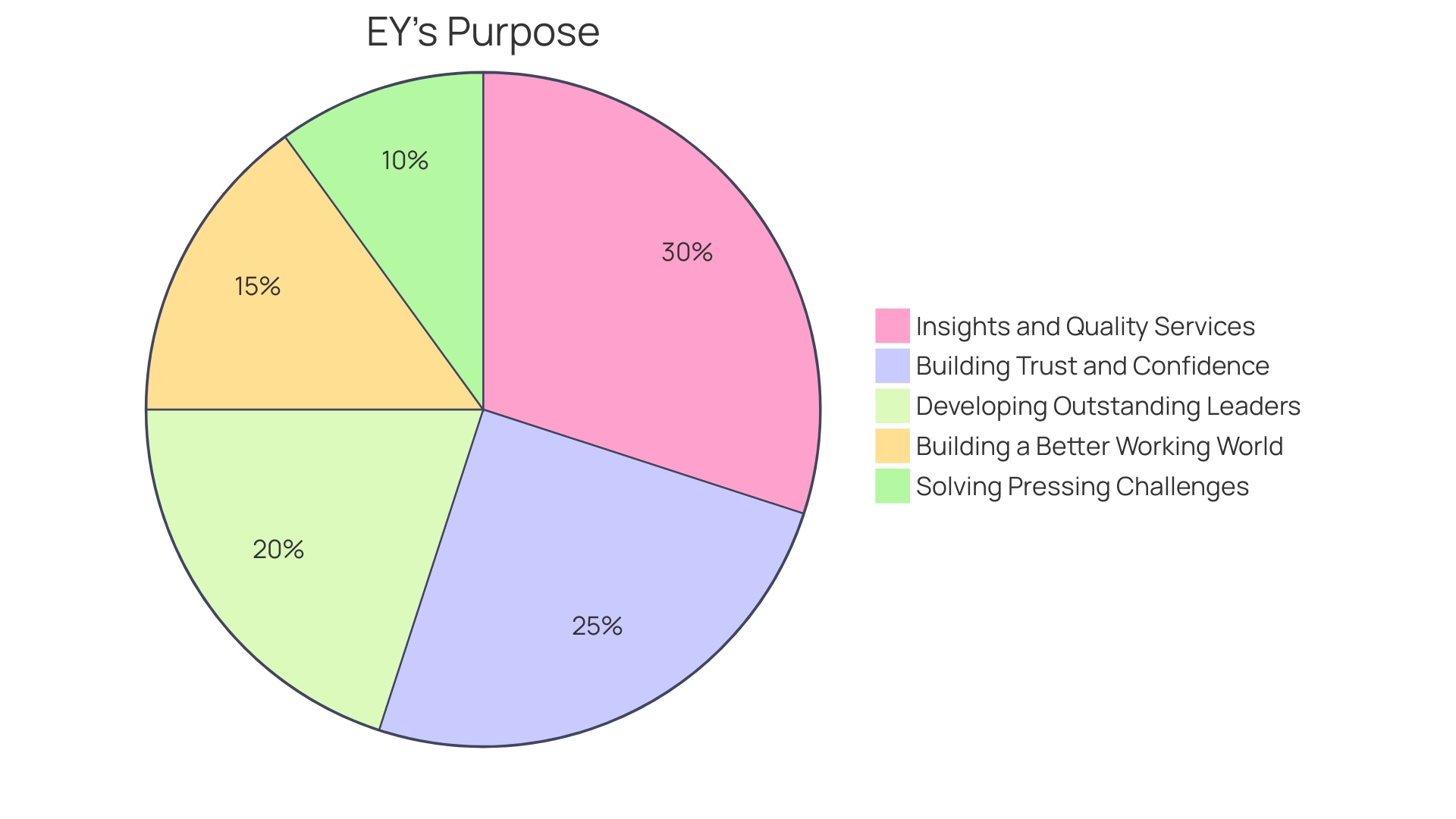
Case Study: Audit Committee Characteristics and their Impact on Earnings Management
Investigating the correlation between characteristics of oversight groups and manipulation of earnings reveals important insights into the mechanisms of fiscal supervision. For example, larger groups of auditors may have more combined knowledge but could encounter difficulties in coordination, potentially affecting their ability to detect earnings manipulation. Conversely, smaller groups may benefit from agility but might lack comprehensive expertise. The variety within these groups, including both professional backgrounds and industry experiences, is equally important, enhancing the capability to examine monetary statements through different perspectives.
Audit quality is further exemplified by the Sarbanes-Oxley Act of 2002, which emerged in response to major scandals. This action emphasized the significance of autonomous and thorough examination criteria, thus enhancing the supervision committees' function in governance and openness.
An examination of the S&P 500 companies, using Ideagen Audit Analytics' 20-year analysis, suggests that fees for financial examination are influenced by the complexity of the firm's financials and the inherent risks assumed by examining firms. These fees are indicative of the thoroughness and comprehensiveness of the examination work needed to guarantee the precision and dependability of reporting.
Recent regulatory proposals, such as the FDIC's heightened standards for banks with substantial assets, demonstrate the ongoing evolution of governance expectations. These adjustments require that examination boards, particularly in the banking industry, uphold a strong comprehension of economic shifts, interest rate volatility, and asset valuation impacts on financial integrity.
Corporate ownership structures, as indicated by recent studies, also play a crucial role in examination fees and complexity. Ownership percentages can affect not only the cost of audits but also the intricacy of the financials and the profitability of the firms. This correlation prompts regulators and practitioners alike to tailor methodologies and mitigation strategies accordingly, ensuring high-quality auditing services.
Auditing firms, in their commitment to quality control, must proactively manage risks within their systems. This approach is crucial for maintaining the trust of those relying on auditors' opinions. As Omar Choucair from Trintech emphasizes, the basis of precise statements lies in clean books that accurately reflect current costs, achieved through tailored accounting software and management education on report analysis.
Case Study: Audit Practices in Specific Industries (e.g., Banking)
In the dynamic landscape of financial audits within the banking sector, understanding the interplay between digital trends and traditional audit practices is critical. Financial institutions are navigating through the digital era, where strategic decisions are not only about present-day operations but also about forecasting long-term impacts. For instance, banks are increasingly embracing digital strategies, such as the use of synthetic data over real transaction data to test new products, as seen in the collaboration between Retail Bank and Credit. This method not only conforms to data minimization principles but also reduces security hazards, guaranteeing customer data protection while confirming the effectiveness of innovative solutions.
Furthermore, auditors in the banking industry must navigate the intricacies of third-party dependencies and operational uncertainties. The reliance on external entities for enhanced operational efficiency brings to the fore the criticality of vetting partners for compliance and security. As regulations evolve, the banking industry witnesses the introduction of methodologies like the Current Expected Credit Losses, which demand a recalibration of management strategies to address potential uncertainties.
The Federal Deposit Insurance Corporation (FDIC) plays a pivotal role in this environment by providing governance oversight and delineating the responsibilities of bank management and boards. This involves managing interest rate uncertainties and comprehending the workings of banking systems, which have become intricate over time because of regulatory modifications and competitive forces.
When it comes to compliance, banks are subject to a hybrid regulatory approach that balances activity-based and entity-based frameworks, prompting banks to be forward-looking and responsive. This ensures that the regulatory environment remains proportionate to the perceived risks and the scale of operations. Essentially, the banking sector's examination practices are a reflection of a continuously changing financial landscape where innovation, strategic foresight, and robust governance are crucial.
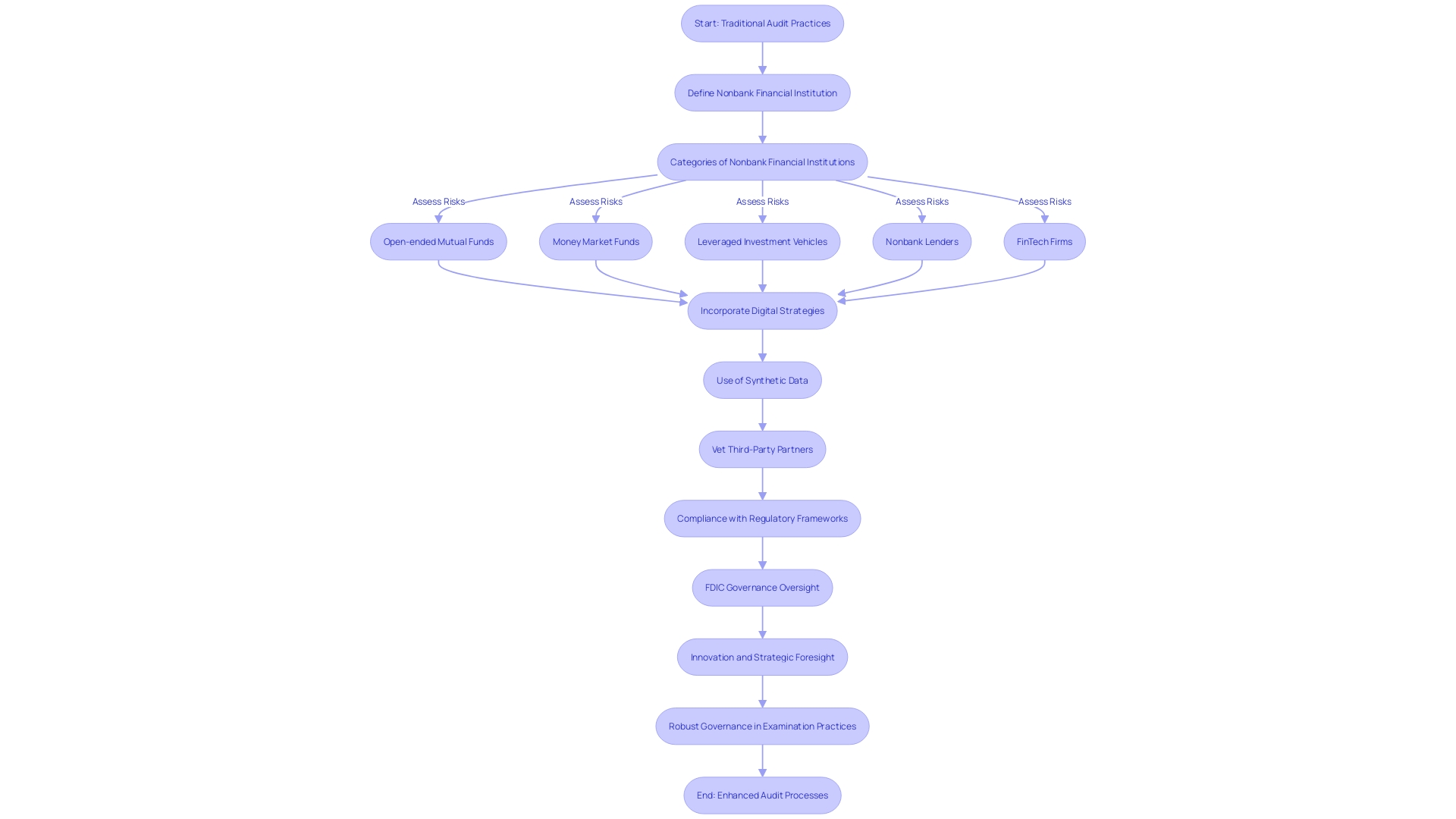
Case Study: The Effects of CEO Duality on Audit Quality
The notion of CEO duality, where a chief executive also holds the position of board chairman, presents a intricate challenge in the realm of quality assurance. This double duty can potentially obscure the boundaries of autonomy, which is crucial for thorough and efficient examinations. The Boeing 737 Max incidents, where persistent quality issues culminated in two tragic accidents, underscore the dire consequences of compromised oversight. These occurrences highlight the significance of thorough examinations and proactive governance to protect against such breakdowns.
To address CEO duality, a comprehensive strategy is essential. As demonstrated by Boeing's experience, which once stood as a paragon of American excellence in safety, lapses in quality control can tarnish a reputation built over decades. The Public Company Accounting Oversight Board (PCAOB), established to prevent close relationships between auditors and firms and to ensure the integrity of reporting, serves as a testament to the necessity of independent examination processes.
In this context, CFOs play a pivotal role. They must cultivate an environment that values accurate public disclosures and adheres to applicable laws and internal policies. The emphasis on a robust risk governance culture cannot be overstated—every individual involved in the disclosure process carries the responsibility of ensuring the reliability of information provided to investors and the markets at large.
A shift in executive mindset is also called for, from omniscience to curiosity, recognizing that the ability to ask the right questions often outweighs having immediate answers. This approach is supported by evidence that suggests the need for a dynamic managerial capability that can adapt to changing circumstances and strategic choices that prioritize long-term family involvement and benefits—a concept well-aligned with fostering a culture of accountability and transparency.
Moreover, the difficulties of comparability in reporting, demonstrated by the unique business models of Coca Cola and Pepsi, emphasize the complexities involved in preserving quality control amidst diverse corporate structures. This complexity reinforces the need for a nuanced and rigorous approach to examination and oversight processes in the face of CEO duality and other potential conflicts of interest.
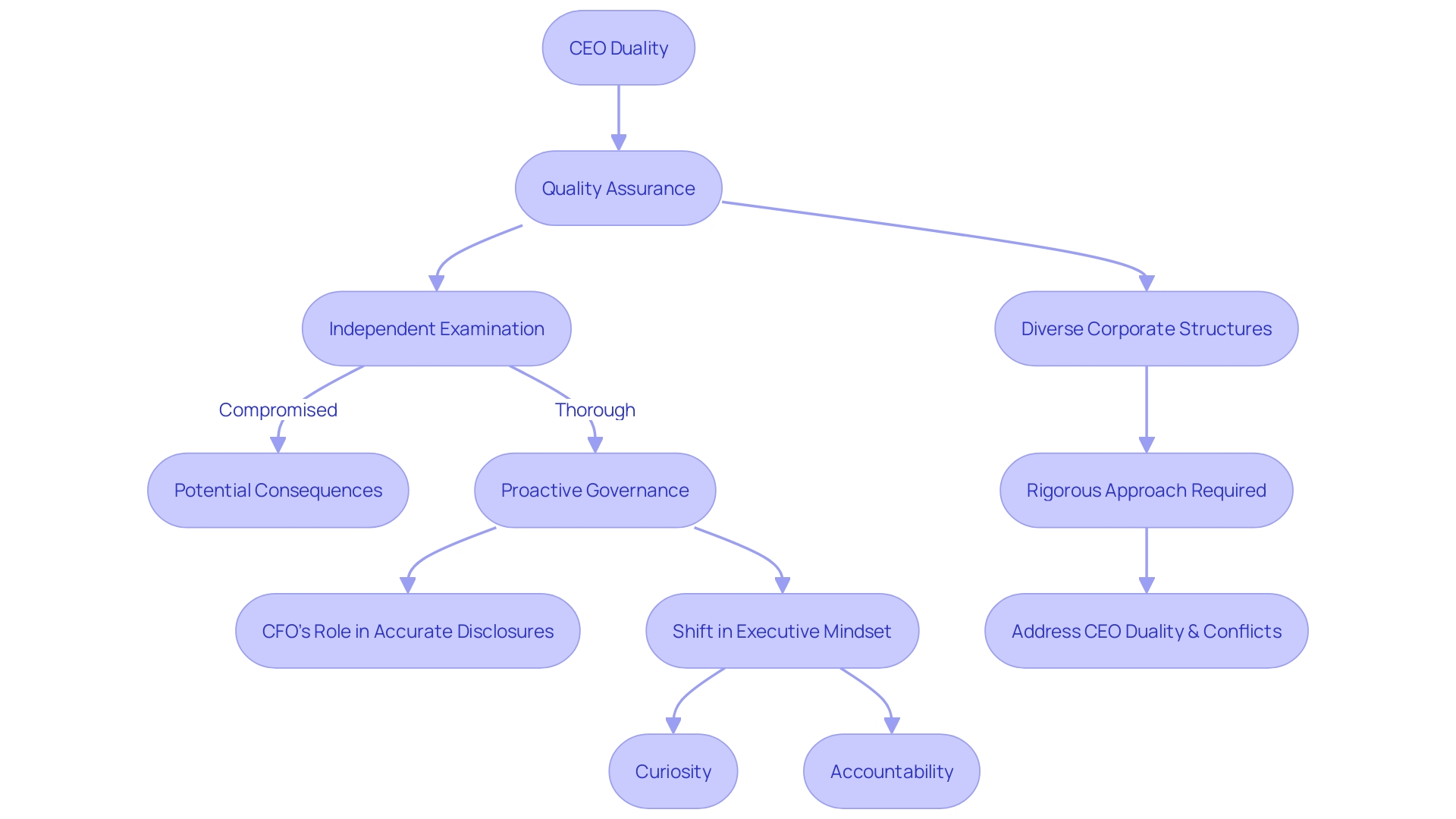
Case Study: Best Practices for Implementing Effective Audit Processes
In the ever-changing domain of financial examinations, organizations are continuously striving to strengthen their processes in the context of digital transformation, especially within the banking industry. Take M&T Bank, a venerable institution with a 165-year legacy, which has embraced the challenge of digitalization head-on. The bank's leadership spearheaded the adoption of Clean Code standards across its development teams. This strategic move was aimed at enhancing the maintainability and performance of its software, ensuring that the bank's operations remain unimpeded by technical debt and security vulnerabilities.
Similarly, Charter's comprehensive IT and consulting services illustrate the value of aligning technology with business strategy. Their approach underscores the importance of adopting a human-centered design and business architecture methodology to facilitate successful digital transformations. This is crucial in the current economic landscape, where innovation and efficiency are key to organizational growth and resilience.
Moreover, in an era where the safeguarding of digital assets is paramount, implementing an Information Security Management System (ISMS) under ISO 27001 standards has become a critical endeavor for companies. This framework rigorously protects information integrity, confidentiality, and availability. It impels organizations to proactively identify and mitigate risks by evaluating policies, personnel, and technological systems comprehensively.
As the industry moves towards a fully digital customer experience, the importance of strong examination processes cannot be emphasized enough. A thorough examination not only detects issues within software but also guarantees compliance with strict security standards to prevent possible breaches that could cause financial and reputational damages. The recent increase in security incidents within the Web3 sphere has emphasized the requirement for comprehensive code evaluations before deploying applications, with a focus on preventing vulnerabilities in smart contracts.
Reflecting on these insights, it's evident that establishing clear-cut success criteria, as suggested by industry experts, is fundamental. Such criteria should be comprehensive, minimal, written, and falsifiable to serve as a definitive benchmark for examination success. This method, combined with the development of auditing criteria to meet the various requirements of professionals, improves the effectiveness of internal inspections.
In essence, these case studies and developments offer valuable lessons for CFOs and finance professionals. They underscore the imperative of integrating meticulous audit processes with organizational strategy to ensure long-term financial integrity and compliance in an increasingly digital world.
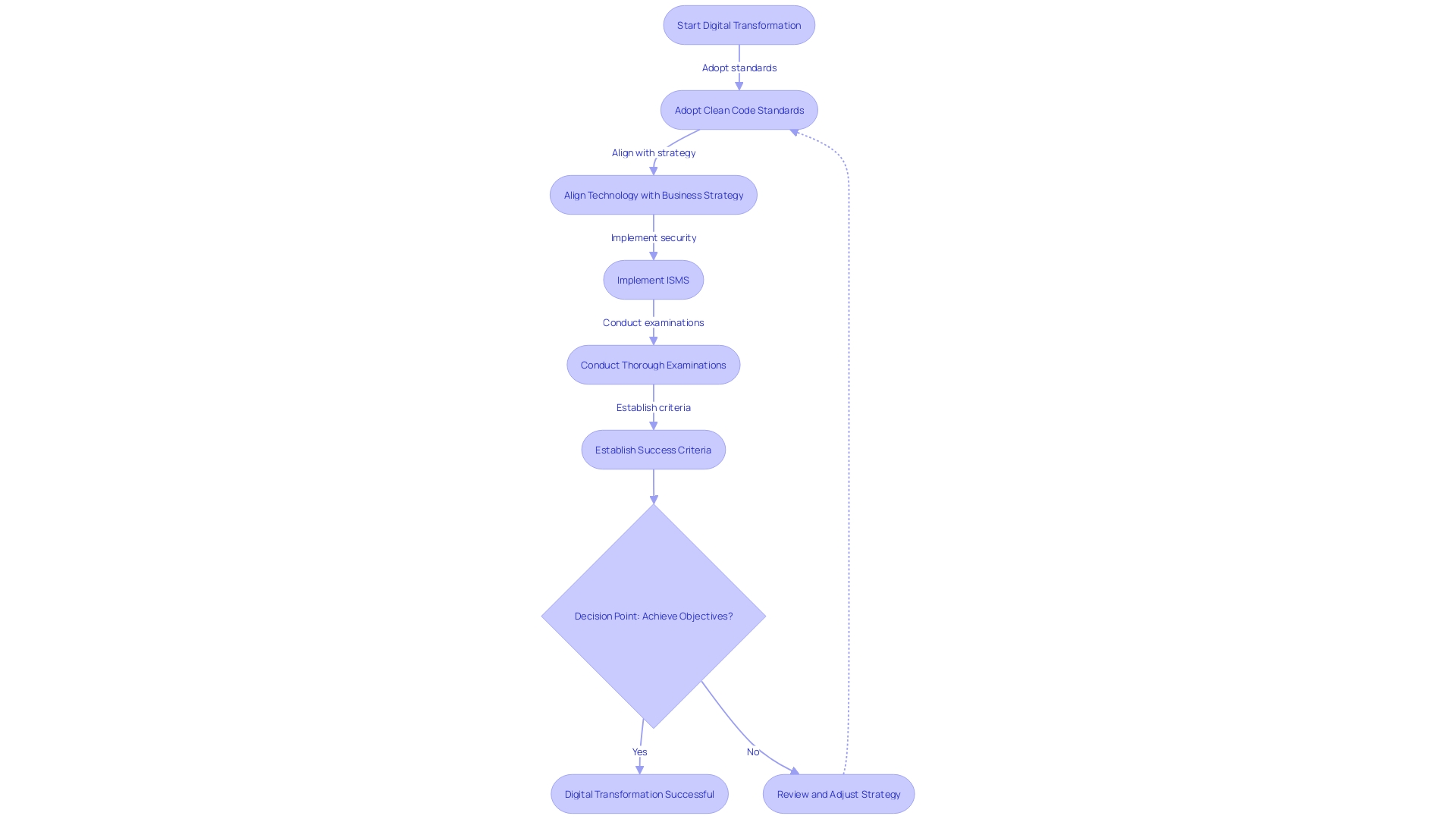
Conclusion
Audit committees play a pivotal role in financial governance, ensuring compliance and safeguarding investor interests. Throughout the case studies explored in this article, the significance of audit committees in maintaining financial integrity is highlighted. These committees navigate complex regulatory landscapes and evolving financial management approaches.
The impact of audit committee independence on financial reporting quality is examined, emphasizing the importance of objectivity and trust in capital markets. The relationship between committee characteristics and earnings management is also explored, showcasing the importance of diversity and expertise within these committees.
Specific industries, such as banking, face unique challenges that audit committees must address. The interplay between digital trends and traditional audit practices in the banking sector is crucial, as financial institutions embrace digital strategies while managing operational risks and compliance.
The effects of CEO duality on audit quality are discussed, emphasizing the need for independent audit processes and robust risk governance. CFOs play a pivotal role in cultivating a culture of accountability and transparency, ensuring accurate public disclosures.
To implement effective audit processes, organizations must adapt to the digital era and align technology with business strategy. The adoption of clean code standards, human-centered design, and information security management systems are highlighted as best practices. Additionally, establishing clear-cut success criteria and evolving auditing standards contribute to the efficacy of internal audits.
In conclusion, audit committees are central to financial management. They ensure compliance, foster investor confidence, and guide organizational strategies. By integrating meticulous audit processes with organizational strategy, CFOs and finance professionals can uphold long-term financial integrity and compliance in an increasingly digital world.




